"Det som mørket ikke kan besidde, forsøger det at ødelægge."
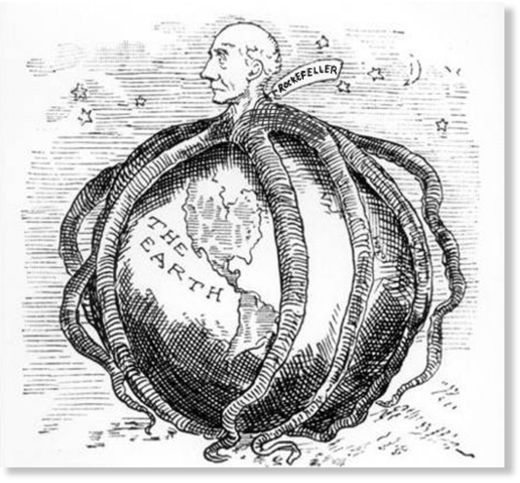
Sandheden om hvorfor vi er, hvor vi er som en art, er imidilertid temmelig enkel. Men for at forstå det, må du smide ideen ud om "en ny kold krig" og erstatte den med "den 120 år gammel krig som aldrig sluttede".
Hvis du ønsker at få din historie kondenseret og relateret til de aktuelle begivenheder, så læs videre.
For over 100 år siden, i 1904, foreslog en af grundlæggerne af både geopolitik og geostrategi, en akademiker fra Universitetet i Oxford og medgrundlægger af London School og Economics, Sir Halford Mackinder, en teori som udvidede geopolitisk analyse fra det lokale eller reionale niveau til det globale niveau. Geopolitik er studiet (udført af mennesker i magtfulde positioner) af indflydelserne af geografi, både menneskelig og fysisk, på international politik og internationale relationer. Med en lægmands ord betyder det studiet af, hvordan man bedst kan kontrollere så meget af verden - dens ressourcer, menneskelige og naturlige - som muligt. Når man tænker over verden, tænker vi på et stort kompliceret sted med milliarder af mennesker. Når "eliten" tænker på verden, tænker de på en globus, eller et kort, med nationer eller stater på det som kan, eller burde, ifølge dem, formes eller ændres som et hele.
Mackinder inddelte verden i bare nogle få regioner
- "Verdensøen", et område der hovedsagelig bestod af de forbundne kontinenter, Europa, Asien og Afrika.
- Offshore-øerne, inklusiv de britiske og japanske øer.
- De fjernere liggende øer, inklusiv det nordamerikanske kontinent, det sydamerikanske kontinent og Australien.
Mackinder nåede sandsynligvis frem til denne konklusion som et resultat af den britiske oplevelse af at være et imperium. Britterne havde et stort imperie over hvilket "solen aldrig gik ned" (og blodet aldrig tørrede op), og mens den britiske elite tjente mange penge og forårsagede mange lidelser ved at ekspropriere andre folkeslags ressourcer, var de aldrig i stand til at virkeligt at "styre verden", fordi "hjertelandet", Rusland, ikke blev besejret og gjort underdanigt til de vestlige magter, hovedsageligt på grund af sin massive størrelse og det faktum, at Rusland allerede længe havde været et imperie i sig selv
I 1904 var Mackinders ideer, delt af hans samtidige, allerede almindeligt anderkendte blandt datidens anglo-amerikanske elite, som søgte globalt herredømme ved at forebygge enhver ved at forhindre nogen konkurrence til USA.
Rusland var en naturlig potentiel konkurrent, igen grundet dets størrelse, resourcer og historie som imperiemagt. Så allerede inden det 20. Århundrede, var eliten fra USA og deres ideologisk ligesindede fra Storbritannien i gang med at "neutralisere" Rusland, der kunne blive en mulig trussel mod deres planer om verdensherredømme. Samtidig med at Mackinder udgav sine teorier havde amerikanske og brittiske industrimagnater og bankfolk sat gang i en process, der skulle ende med regimeskift i Rusland ved at involvere en af "off-shore øerne", nemlig Japan.
Først Krig, så Revolution
I 1898 var Rusland og Kina blevet enige om en konvention, hvor Rusland leasede den kinesiske havneby "Port Arthur" af Kina. På daværende tidspunkt var dette Ruslands eneste havn i den varme del af Stillehavet (og den var af ligeså stor strategisk betydning som Krim er det for Rusland i dag). Både englænderne og amerikanerne var bekymrede over det tætte forhold mellem Rusland og Tyskland (Tzar NikolasII og Kejser Wilhelm II af Tyskland var fætre) og muligheden for at Frankrig sluttede sig til dem i en tredobbelt anti-britisk alliance. Britterne og amerikanerne så dette som en klar "trussel mod den internationale verdensorden"1. For at ødelægge Ruslands intentioner i Asien, underskrev Japan og Storbrittannien i 1902 den "Anglo-Japanske alliance", hvor der stod at hvis enten Japan eller Storbrittanien blev angrebet af mere end én fjende, så ville de støtte hinanden militært. Dette var i praksis grønt lys fra Storbrittanien til at Japan kunne føre krig mod Rusland hvis der var behov for det og Japan kunne være tryg i visheden om at hverken Frankrig eller Tyskland (Ruslands allierede) ville intervenere og risikere krig med Storbrittanien. Herfra og fremefter fungerede Japan som håndhæver af brittiske interesser i Østasien.
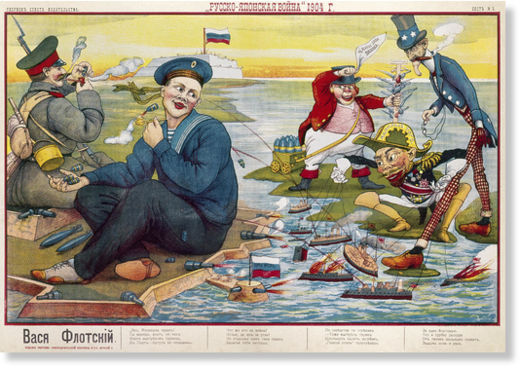
Rusland mønstrede mere end én million soldater og sømænd mod Japans 500.000 men tabte alligevel krigen. Dette skyldtes i høj grad støtte fra USA og Storbrittanien. Det afgørende slag fandt sted den 27-28 maj 1905 hvor den russiske og japanske flåde mødtes i Tsushima Strædet. To tredjedele af den russiske flåde blev destrueret. Ruslands nederlag blev understreget af Portsmouth-traktaten der bekræftede at Japan var den førende magt i Østasien og det tvang Rusland til at skrinlægge planerne om at udvikle det sibiriske stillehavsområde og etalbere handelsruter til fjernøsten. Japan blev samtidig verdens sjette-største sømagt og krigsomkostningerne var et betydeligt slag mod den russiske økonomi.
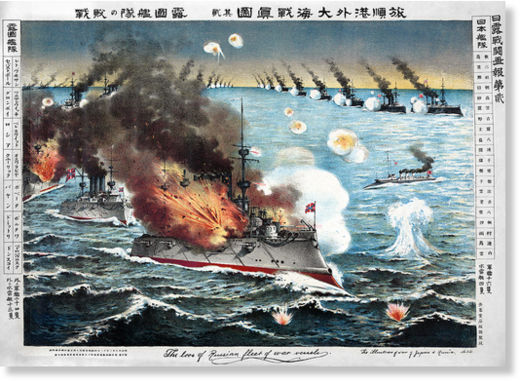
Med et Rusland, der var isoleret og økonomisk i knæ var truslen om den Eurasiatiske integration fjernet og det næste logiske skridt var at fjerne Tzaren helt og aldeles og forvandle Rusland til et kontrollet tilbagestående og "besat" marked som kunne styres af den vestlige finansverden. Men for at opnå dette måtte de først håndtere Kejser Wilhelms Tyskland og det betød krig. For at gøde jorden for det krig underskrev briterne den anglo-russiske entente i 1907 og tilføjede senere Frankrig så det blev til en "trippel-entente", hvorved verdens stærkeste militærmagter blev allieret mod Tyskland.
Mellem 1903 og 1914 blev den britiske offentlighed gradvist styret til et blussende anti-Tyskland hysteri og overdynget med talrige avisartikler, bøger og pamfletter, der (usandt) advarede med Tysklands aggressive militære oprustning og intentioner om at at invadere Storbritanien og overtage verden. Samtidens store britiske avis- og forlagsmagnat, Alfred Harmsworth, der var dybt forbundet med den britiske politiske og finansielle elite havde en enorm påvirkning af den britiske offentlighed gennem hans aviser. I et interview med den franske avis Le Matin udtalte Harmsworth: "Tyskland opfører sig frastødende overfor hele Europa. Jeg vil ikke tillade at min avis trykker noget, der på nogen måde kan være stødende overfor Frankrig, men jeg vil heller ikke bryde mig om at trykke noget, der kan opfattes som positivt overfor Tyskland"4.
Det anti-tyske hysteri kulminerede ved vedtagelsen af Storbritaniens Official Secrets Act fra 1911, der var den egentlige grundlæggelse af de brittiske efterretningstjenester MI5 og MI6. Det er meget passende at disse tjenester, der i dag har til opgave at fremstille terrortrusler for at skræmme den britiske og global offentlighed til at støtte krig, udsprang af en fabrikeret trussel fra Tyskland.
For at udrydde Tyskland, svække de europæiske magter og få hele Europa til at tjene de vestlige bankinteresser, valgte man Balkan-landene som "gnisten" der skulle antænde det hele. I et telegram fra november 1912 fra den russiske ambassdør i Bulgarien til den russiske udenrigsminister (Isvolsky) blev nævnt at der var en repræsentant for den engelske avis The Times, der hævdede at "der er rigtig mange mennesker i England, der arbejder på at optrappe konflikten i Balkan-landene med det formål at starte en krig der resulterer i udryddelsen af den tyske flåde og handel."5
Journalisten fra The Times var højst sandsynligt James David Bourchier, et medlem af det engelske aristokrati der var dybt involveret i Balkan Ligaen, en organisation der blev oprettet i 1912 af den russiske ambassadør til Beograd, Nicholas Hartwig, for at påvirke de Balkan-landenes løsrivelse og uafhængighed fra det Østrig-Ungarnske imperium. Nicholas Hartwig var agent for den engelske konge, Edward VII, og derfor også for den engelske elite6. Uafhængighed for Balkan-landene passed fint med den Britiske elites mål om at opdele konkurrerende imperier.
Lejemordet på ærkehertug Franz Ferdinand i 1914 står skrevet i historiebøgerne som den gnist der antændte Første Verdenskrig. Det er en skævvridning af fakta. Som nævnt havde englænderne haft planer om krig mod Tyskland i mindst 10 år på det tidspunkt. Under alle omstændigheder var lejemord på såvel de kongelige som de adelige ret almindeligt i datidens Europa og Ferdinands død var ikke noget der nødvendigvis ville have ført en verdenskrig med sig. Det Østrig-Ungarnske imperium var naturligvis udelukkende interesseret i at få ro på serberne og Tyskland, Østrig-Ungarns allierede, var entydigt modstander af at krisen eskalerede og kom ud af kontrol.
Kommentar: Vi undskylder at resten af teksten indtil videre er på engelsk, men i vores forsøg på at få så meget ud til vores læsere, må vi engang imellem ty til blot at oversætte en portion af originalen.
After the assassination, the British government deceptively announced to Austria-Hungary and Germany that they accepted Austria-Hungary's right to compensation from Serbia. When Austria delivered its July Ultimatum on July 23rd to the Serbs - a series of demands that were intentionally made unacceptable - it expected a local war to result, but Russian foreign minister Sazonov (another British agent)6 responded by mobilizing Russian forces on July 28th against the wishes of the Tsar. The British also quietly mobilized their own troops in anticipation of a German move against Belgium, which occurred on August 4th.
What neither Germany nor Austria-Hungary realised was that the assassination - the casus belli - had been orchestrated by the Serbs with the encouragement of British agents in the Russian government. In the 1917 court case on the assassination, Serbian colonel Dragutin Dimitrijević confessed that he hired Ferdinand's assassins and that the murder was planned with the knowledge and approval of the Russian ambassador in Belgrade - Nicholas Hartwig - and the Russian military attaché in Belgrade, Viktor Artamonov. Both Hartwig and Artamonov were effectively in the pay of the British government. If it had been widely revealed at the time that the Russians were directly involved in the assassination, the British government could not have justified the war to the British public, who held strong anti-Tsarist opinions, thanks to being systematically fed anti-Russian propaganda during the 'Great Game' of the 19th century. If anything, they would have called for war against Russia.
Even as the Russian and German armies were marching out of their barracks on July 1st, the Tsar and the Kaiser were exchanging telegrams in a futile attempt to avert disaster. In a note he wrote later that day, the Kaiser finally understood the depth of British perfidy:
"I have no doubt about it: England, Russia and France have agreed among themselves to take the Austro-Serbian conflict for an excuse for waging a war of extermination against us... the stupidity and ineptitude of our ally is turned into a snare for us ... the net has been suddenly thrown over our head, and England sneeringly reaps the most brilliant success of her persistently prosecuted purely anti-German world policy against which we have proved ourselves helpless. We are brought into a situation which offers England the desired pretext for annihilating us under the hypocritical cloak of justice." 7It should come as no surprise that during this 'great' war to protect the free world, British and American arms manufacturers, many with links to City of London and Wall Street banks, were arming all sides in the conflict. For just one example, the British-owned Armstrong-Pozzuoli Company, headquartered on the bay of Naples, employed 4,000 men and was the chief naval supplier to Britain's enemy, Italy, and a high-level English naval officer, Rear Admiral Ottley, was a director!8 During the war, Labour MP Philip Snowden angrily told the House of Commons that "submarines and all the torpedoes used in the Austrian navy are made by the Whitehead Torpedo works in Hungary... they are making torpedoes with British capital in order to destroy British ships."9 The same torpedoes were being used by German U-boats to sink British, and later American, ships.
Talk about a revolution
The disastrous effects to Russia of the British-inspired Russo-Japanese war provoked the 1905 Russian 'revolution' that lasted until 1907. That revolution paved the way for the overthrow of the Tsar and the coming to power of the nihilistic Bolsheviks in the October revolution of 1917. The event would define Russia's history for the next 70 years. Far from being an impediment, the fact that Tsarist Russia was a British ally in the middle of WW1 appears, at the time, to have been seen by the British and American governments as an opportunity to stab the Tsar in the back when, and from where, he least expected it.
Like the first World War, the plan for the overthrow of the Tsar and revolution in Russia was years in the making. In fact, it seems that the 1905 Russo-Japanese war was used by the aforementioned Jacob Schiff and Co. to sow the seeds of that 1917 revolution 12 years in advance. In her book, Jacob H. Schiff: A Study in American Jewish Leadership, prolific Jewish-American author Naomi Wiener Cohen states:
"The Russo-Japanese war allied Schiff with George Kennan in a venture to spread revolutionary propaganda among Russian prisoners of war held by Japan (Kennan had access to these). The operation was a carefully guarded secret and not until the revolution of March 1917 was it publicly disclosed by Kennan. He then told how he had secured Japanese permission to visit the camps and how the prisoners had asked him for something to read. Arranging for the 'Friends of Russian Freedom' to ship over a ton of revolutionary material, he secured Schiff's financial backing. As Kennan told it, fifty thousand officers and men returned to Russia [as] ardent revolutionists. There they became fifty thousand "seeds of liberty" in one hundred regiments that contributed to the overthrow of the Tsar."While Schiff was a strident opponent of the Russian Tsar for his treatment of Russian Jews, it's difficult to tell if sympathy for his co-religionists in Russia was the motivation for Schiff, and other Jewish Wall Street bankers and industrialists, to finance the Bolshevik revolution. After all, they all also reaped massive financial rewards as a result.
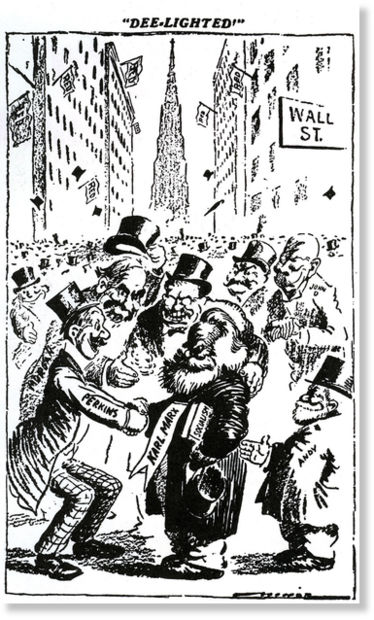
"Some of the passages [in Milner's books] on industry and society... are passages which any socialist would be proud to have written. But they were not written by a socialist. They were written by "the man who made the Boer War." Some of the passages on Imperialism and the white man's burden might have been written by a Tory diehard. They were written by the student of Karl Marx." 11Milner's ideological bi-partisanship - and utter indifference to his German roots - mirrored that of the Wall Street bankers. Speaking to the League for Industrial Democracy in New York on 30th December 1924, Otto H. Kahn, who was Jacob Schiff and Felix Warburg's partner in Kuhn, Loeb & Co. and director of American International Corp., said: "what you radicals, and we who hold opposing views differ about, is not so much the end as the means, not so much what should be brought about, as how it should, and can, be brought about".
De Goulevitch cites reports from local observers and journalists in Petrograd in 1917 of British and American agents handing out 25-rouble notes to soldiers of the Pavlovski regiment just before they mutinied and joined the revolution.5 De Goulevitch also named Sir George Buchanan, the British Ambassador to Russia at the time, as one of the main players in financing what was effectively an early 'color revolution' in Russia.As Jennings C. Wise has written, "Historians must never forget that Woodrow Wilson... made it possible for Leon Trotsky to enter Russia with an American passport."12
With the Tsar gone and the Western-backed Bolsheviks in power, US and other Western governments and corporations had succeeded not only in destroying Russia's economy and industry, but breaking off parts of the Russian empire.The Treaty of Brest-Litovsk is a testament to the fecklessness of the Bolsheviks in that, in order to withdraw Russia from the war, they were forced to cede territory to Germany and Austria-Hungary. The first round of negotiations stalled because the mad-cap revolutionaries believed that Germany and Austria-Hungary were on the brink of revolution themselves. When Lenin and Co. finally came to their senses, they were forced to sign an even more punitive agreement with the Central Powers. While Russia regained much of this lost territory after WWII, it lost it all again in 1991. In fact, Russia's post-1991 western border bears a marked similarity to that imposed by the Brest-Litovsk treaty.
Under Lenin and Trotsky, the Bolshevik 'revolution' had effectively shut down the Russian economy and its industry, allowing Western bankers to step in to 'rebuild'. Consider the words of American journalist, labor organizer, and publicist, Albert Rhys Williams, who was both a witness to - and participant in - the October revolution, as he testified at the Senate Overman Committee:
Mr. Williams: [...] it is probably true that under the Soviet government industrial life will perhaps be much slower in development than under the usual capitalistic system. But why should a great industrial country like America desire the creation and consequent competition of another great industrial rival? Are not the interests of America in this regard in line with the slow tempo of development which Soviet Russia projects for herself?When the Bolsheviks started their first bank, Ruskombank, in 1922, one of its directors was Max May of Guaranty Trust. Guaranty Trust was a J.P. Morgan company. On joining Ruskombank, May stated:
Senator Wolcott: So you are presenting an argument here which you think might appeal to the American people, your point being this; that if we recognize the Soviet government of Russia as it is constituted, we will be recognizing a government that cannot compete with us in industry for a great many years?
Mr. Williams: That is a fact.
Senator Wolcott: That is an argument that, under the Soviet government, Russia is in no position, for a great many years at least, to approach America industrially?
Mr. Williams: Absolutely.
"The United States, being a rich country with well developed industries, does not need to import anything from foreign countries, but... it is greatly interested in exporting its products to other countries, and considers Russia the most suitable market for that purpose, taking into consideration the vast requirements of Russia in all lines of its economic life."13J.P. Morgan's Guaranty Trust also raised loans for the German war effort while simultaneously funding the British and French against the Germans, and also the Russians, both under the Tsar against Germany, and then the Bolsheviks against the Tsar and for the "revolution".14
Via Wall Street bankers, the US government under Woodrow Wilson broke with international convention after WWI and refused to forgive debts from the massive war loans it pumped to its allies, primarily Britain and France.15 Germany was in an even worse position because of the reparations demanded by the extremely harsh Treaty of Versailles. None of these countries were in a position to pay back the money owed, so the 'Dawes Plan' was enacted whereby the US government would loan money to Germany so that it could pay reparations to France and Britain, who would then give the money back to the US to pay off their war debt. That's how 'funny money' works. Nevertheless, World War I was a boon for the USA. It went from owing foreigners $4.5 billion in 1914 to being owed $25 billion by foreigners in 1928, including Europe's war debt. As a result, much of Europe's gold also ended up in Fort Knox. Professor of economics Michael Hudson claims that the motivation for massive US government financial claims on Europe was political rather than economic.
Germany paid off the final tranche of its debt to the US government in 2010. The UK is still paying. The debt to the US and allies from WWI was the primary cause of the collapse of the German economy in the early 1930s that gave rise to Hitler and the Nazis... who were also financed by the same cabal of Wall Street bankers.16
A Brave New World
In 1925, a European theorist of imperialism, Gerhart Von Schulze-Gaevernitz, suggested that history would show that the most important result of World War I was not "the destruction of the royal dynasties that ruled Germany, Russia, Austria and Italy", but the "shift in the world's center of gravity from Europe, where it had existed since the days of Marathon, to America". This new era of 'superimperialism', he said, had turned traditional imperialism on its head because now "finance capital mediates political power internationally to acquire monopolistic control and profits from natural resources, raw material and the power of labor, with the tendency towards autarky by controlling all regions, the entire world's raw materials."17
During the 1920s Russian industry was effectively rebuilt by US corporations, with several of Lenin's five-year plans financed by Wall Street banks. The aim was to prepare Russia for WWII, where it effectively won the war for the allies but was largely ruined (again) in the process and, like the other European powers, incurred massive debt to Wall Street and London bankers. As revealed by Antony Sutton, the extent of Western influence and control inside Soviet Russia is exemplified by the fact that, during the Vietnam war, the military vehicles being used by the North Vietnamese military to fight American soldiers were produced in a Soviet factory, the Kama River Truck Plant, owned by the US Ford corporation.
By imposing the Bolshevik Revolution on Russia, Wall Street ensured that it could not compete with the USA. For the next 70 years, the 'managers of the world' in the US and Western Europe expanded their global domination through the use of a bogus "Communist threat" (which they created). In the late 1980s, the Western banking elite decided that their global power was sufficient to allow them to pull back the 'iron curtain' and, once again, open Russia up, but this time for some 'free market', 'open society' neo-liberal plunder. All was going to plan for most of the 1990s until Vladimir Putin arrived on the scene and began to spoil the Western elites' 'we rule the world' party.
So what's the point of this little history lesson? I hope it serves to highlight two things. That over 100 years ago the Western banking/corporate/political elite - the type of people who think, and say, things like...
"To think of these stars that you see overhead at night, these vast worlds which we can never reach. I would annexe the planets if I could; I often think of that. It makes me sad to see them so clear and yet so far."...understood clearly that the only way they were going to rule the world was to ensure that Russia never emerged as a competitor to their center of operations - London, and then the USA. From a practical perspective, to achieve that goal they were going to have to perpetually marginalize Russia on the Eurasian continent and prevent European nations, in particular Western European nations, from ever forming an alliance with Russia. That task began in earnest in the late 1890s. It continues to this day, but it is failing.
"I contend that we are the first race in the world, and that the more of the world we inhabit the better it is for the human race."
~ Cecil Rhodes
The Best Laid Plans...
Since coming to power Putin has made moves to do to Russia precisely that which the Western banking elite spent over 100 years trying to prevent: make it a strong independent country, free (to the greatest extent possible) of the Western bankers' toxic influence. Even worse, Putin's plan does not seem to be limited merely to freeing Russia, but includes the idea of using Russia's influence to establish a new 'new world order', based not on the hegemony of the few, but on multipolarity, real national sovereignty, mutual respect, and genuinely fair trade among nations. In their 15 short years at the helm in Russia, Putin and his friends have gone a long way towards achieving their goals. The response from the Western elite has been interesting to watch. From NATO's attempts to encircle Russia in Eastern Europe, to economic sanctions imposed on the basis of trumped-up charges, to sabotaging Russia-EU economic relations, to staging a coup in Ukraine in 2014, to manipulating the price of oil and assassinating 'opposition figures' inside and outside Russia; the anglo-American elite are resorting to increasingly desperate and hysterical measures to maintain the global imbalance they worked so hard to achieve. But nothing they do seems to phase Russia or divert it from the path it has chosen.
So what can we expect next from the Western elites? Short of all-out nuclear war with Russia (which is not and never was an option, contrary to Cold War propaganda) what scurrilously duplicitous maneuvers are left to be made? Not many, to be sure. Perhaps the only weapon left in their arsenal is the one that, more than any other, has allowed them to dominate the globe for so long: the almighty US dollar, its position as the world's reserve currency, and the 'petrodollar'.
For decades, these two financial 'instruments' have forced all other countries to hold large reserves of the American currency, thereby providing the US economy with a 'free ride' and securing its position as the world's largest economy. If the US dollar were, for some reason, to collapse, it would create massive panic in the world economic system, and result, quite possibly, in the collapse of governments around the world. This is likely the reason that both Russia and China are wasting no time in establishing the basis for a new economic order that is not dollar-based. If that initiative progresses far enough, there may come a time in the near future when the dollar can be safely 'ditched' and replaced with another reserve currency, or basket of currencies, thereby avoiding or mitigating the systemic threat to the global economy (if not the US economy) of a dollar collapse, and forcing the Western elite, with their base of operations in the USA, to accept a more humble and justified position among the nations.
Anyone who has investigated and understood the nature of these "elites" of which I speak, knows that they are not the type of people who simply accept defeat, even when it is staring them in the face. They're like a highly narcissistic chess player who, seeing that 'check mate' is almost upon him, opts to knock all the pieces off the board (and maybe burn it... and the room) rather than suffer the ignominy of defeat. It can then be claimed, 'see, you didn't win, we'll have to start again'. The chess analogy is appropriate given that one of the main exponents of Mackinder's theories of Eurasian strategy is Zbigniew Brzezinski, author of The Grand Chessboard, where he wrote "it is imperative that no Eurasian challenger emerges, capable of dominating Eurasia and thus of also challenging America."
With the US debt currently running at over 104% to GDP (and rising), and the US unable or unwilling to reduce that debt or to increase GDP, the USA is effectively insolvent, a 'failed state' in all but name. The only thing preventing its economic collapse is the dependency, for now, of so many other nations on the US not collapsing. Is it possible that, facing the almost certain end to their reign as rulers of the world, the Western psycho-elite will chose the 'financial nuclear option' of 'doing an Enron' and collapsing the American dollar in a last, insane and futile effort to avert defeat by bringing the whole house of cards down... so they can 'rebuild' from scratch?
As my opening quote asserts: "what the darkness cannot possess, it seeks to destroy."
Notes
1 Chapman, John W. M. Russia, Germany and the Anglo-Japanese Intelligence Collaboration
2 Schiff organised the purchase by US investors of $200 million in Japanese bonds
3 Farrer, England Under Edward VII p. 143
4 Stieve, Isvolsky and the First World War p. 116
5 Durham, Twenty years of Balkan Tangle ch 19 pp 2-3 and Docherty and Macgregor, Hidden History: The secret origins of the First World war Ch.18
6 See; Docherty and Macgregor, Hidden History: The secret origins of the First World war Ch.16
7 Barnes, Genesis of the World War, pp. 268-9
8 Perris, The War Traders: an Exposure
9 Murray, Krupps and the International Armaments Ring: the scandal of modern civilization p.3
10 De Goulevitch,: Czarism and Revolution, Omni Publications, California, pp. 224, 230
11 Crankshaw, The Forsaken Idea: A Study of Viscount Milner (London: Longmans Green, 1952), p. 269.
12 Wise, Woodrow Wilson: Disciple of Revolution (New York: Paisley Press, 1938), p.45
13 Sutton, A. Wall Street and the Bolsheviks Ch. 4
14 ibid
15 Hudson, M. Super Imperialism: The Origin and Fundamentals of U.S. World Dominance p. 50
16 Sutton, A. Wall Street and the Rise of Hitler
17 ibid
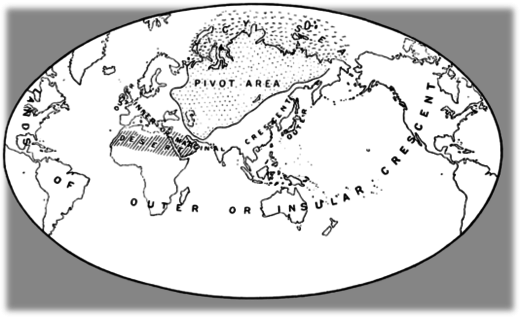
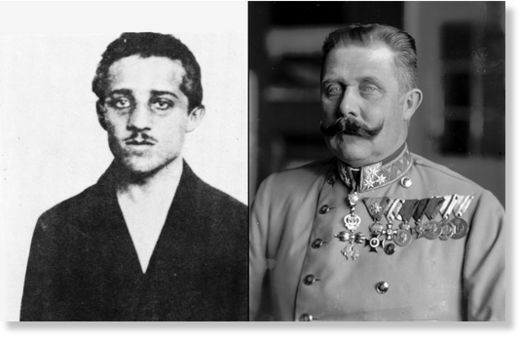
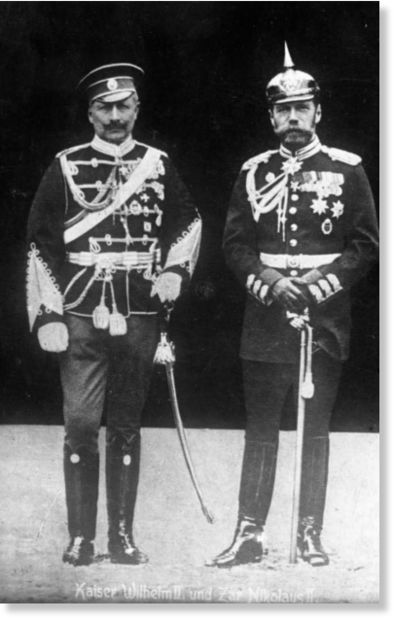
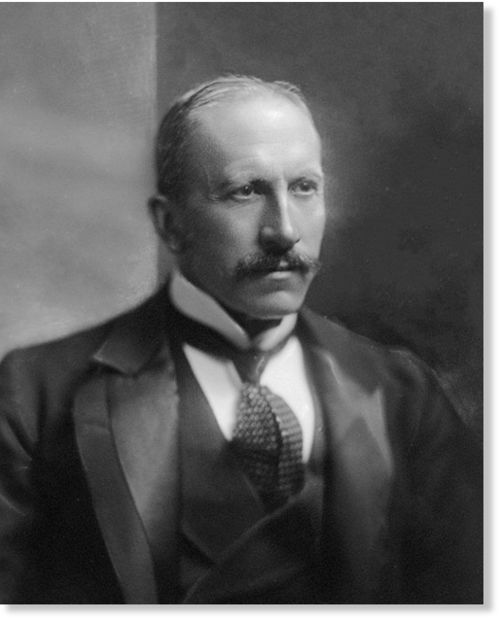
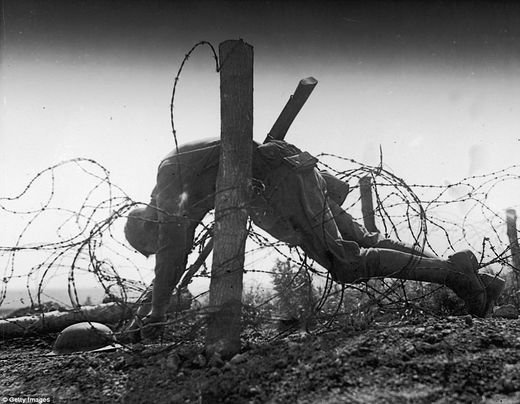
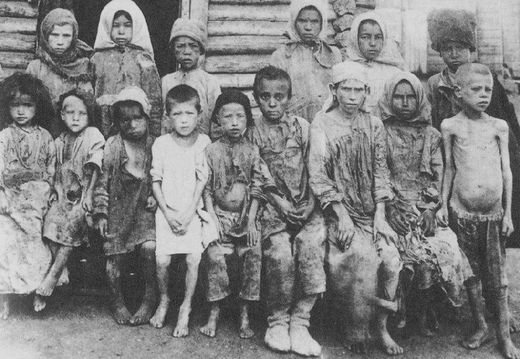
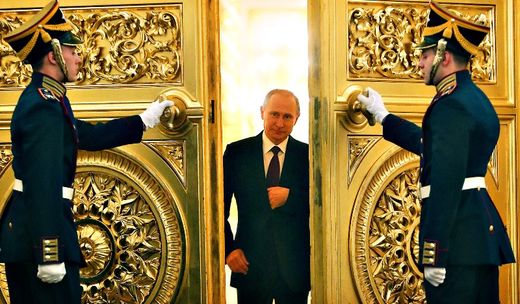
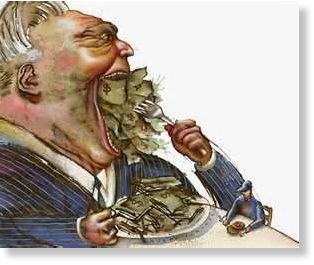



Kommentar: For mere om muligheden for en overhængende global systemisk krise (eller snarere, en dybtgående forværrelse af den nuværende), kan læserne se diskussionen i tråden på vores forum, hvor der er overvejelser over, hvordan sådan en krise kunne udspille sig, og hvad man kan gøre for at forberede sig på dens virkninger.